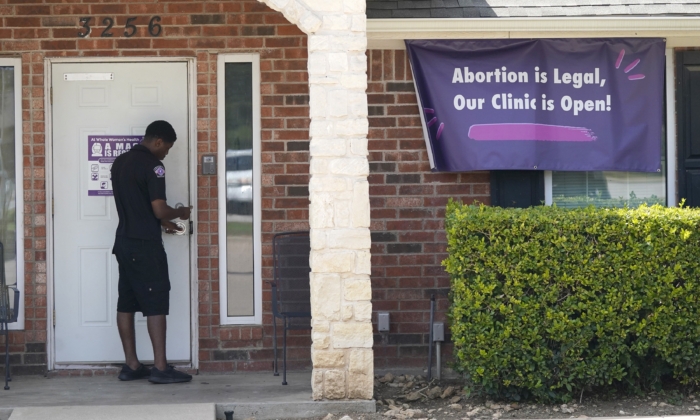By Ivan Pentchoukov
A federal judge in Austin, Texas, granted a temporary injunction on Oct. 6 against the Texas anti-abortion law that drew national attention after it recently survived judicial scrutiny by the Supreme Court.
U.S. District Judge Robert Pitman, an Obama appointee, opined that “a person’s right under the Constitution to choose to obtain an abortion prior to fetal viability is well established.”
“Fully aware that depriving its citizens of this right by direct state action would be flagrantly unconstitutional, the State contrived an unprecedented and transparent statutory scheme to do just that,” Pitman wrote in the 113-page ruling, referring to the unique enforcement mechanism in the Texas law.
“The state created a private cause of action by which individuals with no personal interest in, or connection to, a person seeking an abortion would be incentivized to use the state’s judicial system, judges, and court officials to interfere with the right to an abortion.”
The judge denied the state’s request to delay the enforcement of the injunction until it files an appeal with a higher court.
“The State has forfeited the right to any such accommodation by pursuing an unprecedented and aggressive scheme to deprive its citizens of a significant and well-established constitutional right,” Pitman wrote.
“That other courts may find a way to avoid this conclusion is theirs to decide; this Court will not sanction one more day of this offensive deprivation of such an important right.”
The state, soon after the ruling was issued, filed an appeal to an appeals court.
“We disagree with the Court’s decision and have already taken steps to immediately appeal it to the Fifth Circuit Court of Appeals,” Texas Attorney General Ken Paxton said in a statement emailed to The Epoch Times. “The sanctity of human life is, and will always be, a top priority for me.”
Nancy Northup, president and chief executive of the Center for Reproductive Rights, which is representing abortion providers in a separate suit over Texas Senate Bill 8, said in a statement that the injunction “is a critical first step in restoring abortion rights and services in Texas.”
“For 36 days, patients have been living in a state of panic, not knowing where or when they’d be able to get abortion care. The clinics and doctors we represent hope to resume full abortion services as soon as they are able, even though the threat of being sued retroactively will not be completely gone until SB8 is struck down for good,” she said.
Texas Right to Life, a pro-life group, called the ruling “wildly broad.”
“The provision blocking lawmakers is entirely unnecessary since the language of the Texas Heartbeat Act already prohibits government officials from enforcing the policy. However, Pitman’s effort to obstruct state judges and court clerks from fulfilling their lawful duties is astonishing,” the group said in a statement.
Pitman’s ruling is part of a case brought by the Biden administration against the state of Texas. The administration challenged the constitutionality of SB8, a law that bans virtually all abortions after a heartbeat is detected in an unborn child. The law, which survived judicial review by higher courts, employs an enforcement mechanism that leaves it to private parties to sue the persons involved in an abortion, except for the mother.
Read More From The PatriotAmerican
In a sign of his ideological alignment, Pitman used the term “pregnant person” to describe expectant mothers, noting that he “recognizes that not all pregnant people identify as women.”
In addition to the Biden administration, a large group of abortion providers is likewise suing Texas over the constitutionality of SB8. The Supreme Court, in that case, denied the plaintiffs’ request for an injunction or stay, noting that it “raised serious questions regarding the constitutionality of the Texas law at issue.”

